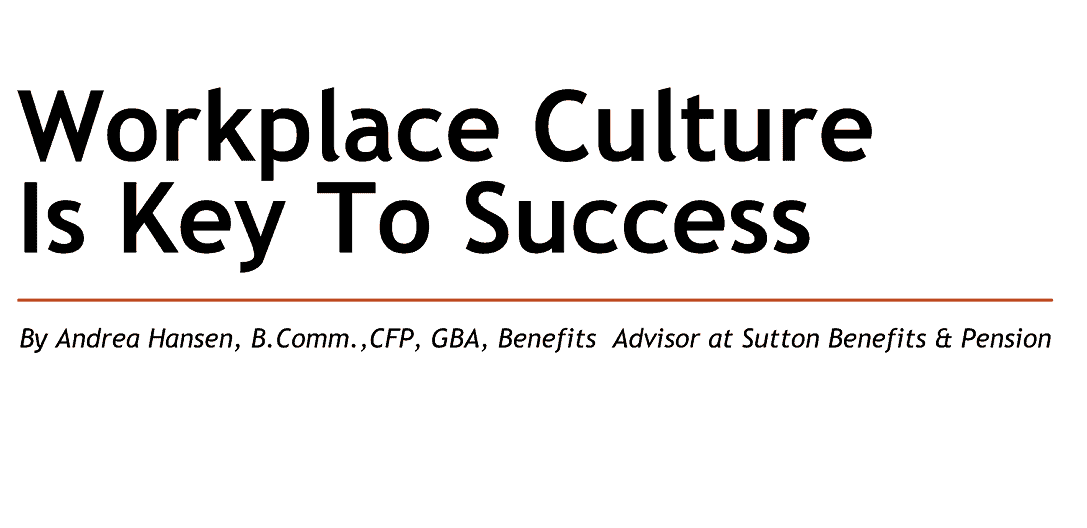Are your benefits and pension plans supporting your culture?
Understanding your culture is the key to creating a dynamic team and long-term business success. Company culture has a major influence on employee behaviour and retention and sets the tone for the way people interact, communicate, and make decisions. As a result, it affects productivity and growth.
Your actions – not just your words – set a powerful example. If you don’t keep your finger on the pulse of your company’s culture, it could quickly erode. Culture is a shared responsibility, and it can’t be ignored, compartmentalized, or delegated if you want to see a positive impact on the bottom line.
“I disagree that people are the greatest asset. The right people are the greatest asset and negative people are very disruptive. It only takes one disrupter to ruin a culture that took so long to build. Teaching leaders soft skills is just as important as hard skills to build culture,” said Tom Foster, president and CEO, IMM.
When asked, “Which comes first, leadership or culture?” most people say leadership. That makes sense because leadership drives culture. Does your business’s leadership believe in the value of supporting the health, wealth, and wellbeing of your employees?
If you pay employees well, they can cover their own health expenses and retirement savings, right?
Some employers do not recognize how Workplace culture is key to success Are your benefits and pension plans supporting your culture? employee mental health, financial security, and wellbeing are linked to the company’s bottom line.
The days when a good paycheque and an annual raise were enough are gone. Today people want to work for employers that respect their personal life and care about them as people. They seek benefits that help them live better lives. Employees who feel valued are much more likely to go above and beyond for the company.
If a benefits and pension plan is a onesize-fits-all plan that simply ticks a box and hasn’t evolved, you’re likely not getting the best value. But how do you design a plan that supports your culture?
Benefit plans need to support different aspects of wellness to positively influence employee engagement and productivity. Wellness has three key components:
1. Mental Health
In any given year, one-in-five Canadians experience a mental illness or addiction, and one-in-two Canadians will have had a mental illness by age 40.¹
Employees’ mental health affects not only their performance, but also your workplace environment and business results. Poor mental health leads to absenteeism, disengagement, accidents, and increased disability and health benefit costs. We cannot ignore those results. Providing access to an Employee Family Assistance Program to support mental health and overall wellbeing is a must.
2. Physical Health
A fundamental shift of mindset and policy – away from current treatmentcentric plans and toward prevention – is critical. With three-quarters of Canadians aged 25 to 64 currently in the workforce,2 and a majority of them exhibiting two or more risk factors for chronic disease, employers will be dealing with direct and indirect medical costs well into the future.
In 2018, 39 per cent of Canadians took two or more days off work for medical appointments.3 When medical appointments are delayed, medical conditions persist and conditions can become chronic, driving up prescription drugs costs and reducing productivity. Telemedicine is a smart investment to help employees access immediate care.
3. Financial Health
“Sixty per cent of the financially unprepared delayed or didn’t obtain various services aimed to improve their health due to financial constraints.” In contrast, “the financially prepared reveal they’re more than twice as likely as the unprepared to have a strategy to manage and maintain their health.”4
If financial unpreparedness is a significant source of stress and those who are financially prepared are more likely to maintain their health, then how can we not consider financial health as part of our wellness strategy? And how does employee financial health affect you as a business owner? In the short term, cash advances, use of sick days, absenteeism, decreased productivity, and disengagement are some results of poor financial health.
In the long term, consequences can include the delayed retirement of loyal long-term employees whose productivity may be declining and whose health care needs and risk of disability are increasing. If employees are not financially prepared for retirement and need to keep working, what is the cost to the business?
“ Good enough” is not enough in today’s market
If you are any size of business, benefits and pension are the minimum. In other words, “If you’re open for breakfast, you better serve eggs”. But not all employers’ “eggs” are all they’re cracked up to be. Just like upgrading equipment, benefits and pension plans need to be upgraded to today’s standards.
“Just because you think you figured [company culture] out yesterday, does not mean it is good today. Culture evolves as your team grows and develops. Leadership must closely monitor the pulse to ensure they are evolving with the team,” said Jodi Lant, human resources lead-Canada, Timken Canada LP.
Your company culture is what sets you apart from the competition and certainly influences employees’ decisions. Do your leaders understand the meaning behind your strategically designed benefits and pension plans? If valuing employees’ health, wealth, and wellbeing is part of the company culture and your leaders are walking the talk, everyone benefits, including your customers.
1. Smetanin et al. The Life and Economic Impact of Major Mental Illnesses in Canada: 2011-2041. Prepared for the Mental Health Commission of Canada. RiskAnalytica, 2011.
2. Sunlife. Profits of Wellness: Turning the High Cost of Poor Health Habits into Healthy Returns. 2011. https://www.sunlife.ca/static/canada/Sponsor/Bright per cent20papers/CHIper cent20BrightPaper percent20E.pdf
3. Hill+Knowlton Strategies/Wello. Workplace Health and Wellness: A Survey of Canadian Workers. Hill+Knowlton, July 2018.
4. Manulife Financial/Ipsos Reid. Manulife/Ipsos Reid Health and Wealth Study 2015. Manulife Financial, 2015.
Published in the November 2021 edition of the Potash Producer E-Newsletter.



